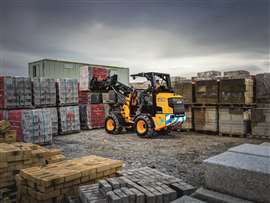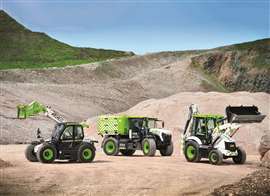JCB’s electric and hydrogen milestone
25 October 2023
The British OEM announces new equipment across a range of technologies. Mikes Hayes reports from its German headquarters.

At a time when OEMs worldwide are searching for the next technological breakthrough, JCB is backing its development programme with hard cash and human resources.
So far, the United Kingdom-based equipment supplier has invested more than £100 million (US$124 million) in the production of hydrogen engines, with a team of 150 engineers committed to the project during the past two years.
This summer, the initiative reached a major production milestone with its 50th hydrogen combustion engine.
Electric technology
JCB says its commitment to reducing emissions goes back to the last century, with its latest diesel engines designed to comply with European Stage V regulations, delivering a 97% reduction in NOx emissions since 1999 and a 98% drop in particulates.
JCB has also developed electric technology to meet customers’ demands for zero-carbon products. While battery electric is suitable for smaller machines which do less hours and typically use less fuel, larger machines have a higher energy requirement.
As a result, JCB has concentrated its development of electric machines on its compact range, including the 525-60E Loadall telehandler and the 19C-1E mini excavator.
In addition, its machines today use less than half the fuel of those manufactured more than ten years ago.
JCB is now introducing its first fully electric wheeled loader, which boasts the largest standard battery pack in its class, with a 20 kWh capacity and productivity matching its diesel counterpart.
Hydrogen power at the ready
In an event at its German headquarters at Frechen, near Cologne, the announcement also revealed that JCB’s hydrogen engines are already powering prototype backhoe loaders and Loadall telescopic handlers and it has also recently unveiled its own designed and built mobile refuelling bowser for the machine.

While the manufacturer looks to the future with its hydrogen engines, the development of the 403E – its first full electric compact wheeled loader – is firmly fixed in the present.
The latest in a series of electric products from JCB, the 403E is described as a way of “helping customers to meet the challenge of carbon reduction on site”.
It is said to have capacity for a full working day, or between four to five hours of continuous use in a mixed duty cycle.
Features include a 20 kWh lithium-ion battery pack; 33.4 kW drive motor (peak power); 20 kW hydraulic pump (peak power); ZF axles with an integrated drop-box for permanent four-wheel drive and digital dashboard and rotary controller for precision operation.
Rapid charging
The 403E has a built-in charger that allows connection to a range of on-site power sources. A 110-V socket will fully charge the batteries in 12 hours, while a 230-V plug will charge the battery pack in eight hours.
POWER SOURCING GUIDE
The trusted reference and buyer’s guide for 83 years
The original “desktop search engine,” guiding nearly 10,000 users in more than 90 countries it is the primary reference for specifications and details on all the components that go into engine systems.
Visit Now
STAY CONNECTED




Receive the information you need when you need it through our world-leading magazines, newsletters and daily briefings.
CONNECT WITH THE TEAM













